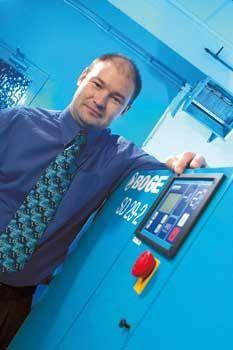Regular maintenance is the key to reducing life-time maintenance costs. From the outset, if maintenance cost is a criterion of the initial purchase of a compressor then the client must look outside the box. For example: an optimised and energy efficient compressed air system will require the least maintenance; compressors which are correctly specified for the application will naturally require less maintenance as they will be performing optimally and efficiently (kW/m3) – off-load running costs can be eliminated, stop-starts therefore eliminated. Opting for a quality engineered compressor will also ensure minimal maintenance requirements. As an example, the Boge S series screw compressor modular concept assures an uncluttered cabinet and a simplified service-friendly layout. As a result, Boge screw compressors need fewer components than conventional models; this saves on service and spare parts costs and increases availability and operating reliability. Integrating a compressed air management system is a further measure that can be taken to ensure that only the most energy efficient supply of compressed air is used – providing an on-going audit to track system changes in order to maintain optimum efficiency. Ensuring the integrity and quality of the actual maintenance work required will also impact on the related costs. Opting for trained and authorised manufacturer service technicians, along with only using genuine spare parts and approved lubricants, will affect the long term maintenance related costs. A common cause of poor efficiency is the use of spurious spare parts. Not using the manufacturer’s genuine parts, for example oil filters and separators can drastically alter compressor specification and efficiency. In turn, this will create additional maintenance requirements. You should also consider the recommended operating hours of the compressor between service intervals. The frequency of maintenance required will also be affected by the quality and longevity of consumables proposed by the service provider (for example, OEM parts versus spurious parts). The initial choice of lubricant will also impact on lifetime maintenance costs. As an example, the service regimes of a lubricated screw compressor will vary depending on whether a mineral or synthetic lubricant is used. Lubricant choice affects the operating hours recommended between service intervals. Those using mineral lubricants will require more frequent service visits. Follow the schedule For existing compressor systems, cutting maintenance costs by reducing maintenance frequency on compressors may seem a plausible solution to reducing short term costs in light of increased energy and business overheads. However, beware! Cutting regular prescribed maintenance will lead to increased costs in the long term. The integrity and efficiency of a compressor will be jeopardised if a recommended service schedule is not followed – with unnecessary premature wear and tear to parts as well as a reduction in the air quality as possible outcomes. Poor air quality will lead to increased costs in other areas of the business. As an example, an inefficient compressor being used to power a paint spray system may create inconsistencies and blemishes in a paint job. As a result, additional materials and resource may be required to touch up or re-paint the end product. Moreover, a compressor running inefficiently uses more energy, which will increase compressed air related electricity bills. One of the most common misconceptions we have come across is that regular maintenance doesn’t matter. This derives from the time that the piston compressor was the only way of generating compressed air. The modern screw package is totally different. Properly maintained they are reliable and efficient work-horses. Without regular maintenance they quickly become unreliable – initially with petty control issues (intake or solenoid based perhaps). In the unluckiest situation it could cause premature air-end failure. In order to keep costs to a minimum, when planning a compressor maintenance program it is recommended that you consider: how many hours a day the compressor operates; what the prevailing site conditions are; whether a mineral or synthetic lubricant is used and whether the compressor is brand new or a used machine. It is a fact that caring for your compressor optimises its efficiency and reliability. Opting from a choice of OEM’s consumables alongside following the recommended service schedule, will ensure that the integrity of the compressor is maintained and efficiency is retained – keeping maintenance, consumables and energy costs to a minimum. Opting for a prescribed maintenance plan for your compressed air system will certainly assist in reducing your business costs in the long term. Simon Wood is national sales manager for Boge Compressors Limited. reader enquiries quote: D081028
Prescribed maintenance reduces your business costs
General
Tuesday, 30 September 2008






